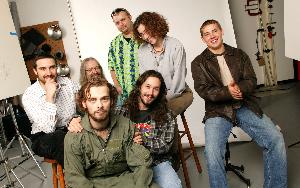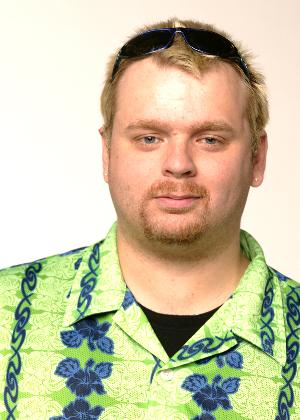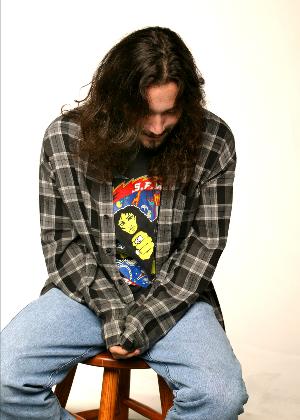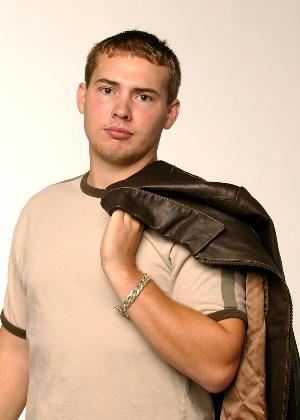social bookmarking tools:
 |
|
| Available RSS Feeds |
|---|
 - Top Picks - Top Picks |
 - Today's Music - Today's Music |
 - Editor's Blog - Editor's Blog
|
 - Articles - Articles
|
Add Louisville Music News' RSS Feed to Your Yahoo!
|

Travis Meeks
Orange • Red • Green • Tree
There is genius and then there is madness and a fine line, it is said, divides them.
One day you're recording a four-track demo tape of your own music in your sister's basement. Practically the next day, you're opening gigs for Metallica and your debut album is on fire, heading for platinum sales; that's madness. Genius, many people claim, is what got you there...at 17 years of age.
The web provides a semi-trailer's worth of information on Travis Meeks/Days of the New. Some is very informative, a lot is repetitive and some is comprised of biased, juvenile stabs at Meeks. Some people think he deserves those stabs. His career has been anything but smooth sailing. His story starts with one question: How did a minikin dude from a sleepy Southern Indiana town become a musical giant at such an early age?
Childhood Daze
Was there something unusual in the tap water or the air in Charlestown, Indiana during the Eighties? There might have been, but Travis Meeks could be the only person from that town that's been called a musical genius, even by people who are not fond of him.
Meeks left the womb in April 1979, beginning a barefoot walk along a gravel road. Raised by his paternal grandmother, Norma Meeks, he swung on a pendulum of geography between Indiana and Texas, where his dad, Gary, lived.

A common misunderstanding is that Meeks began playing music at age eleven. Clarifying, he stated, "I think that was my vague understanding. I got serious at 11...ages 2 to 10 really determined my years, because that was the time when I would take a little jam box and record silly little tunes. That's when I was really at my best, when I was a kid...so, I got serious and structured at age 11, but as far as I can remember, I've always played music."
He studied piano in a strange and interesting way. He had the desire, but nobody was interested in giving lessons to a 6-year-old kid. To get someone to teach him piano, his grandmother took lessons with him. Meeks got his first guitar at a very young age and was learning cover tunes, as well as writing his own material, by the time he was eight years old.
Storm clouds hovered as the diminutive Meeks was often picked on and was diagnosed with at least one learning disability, which landed him in special education classes. Adolescence included drinking and drug habits and becoming a father at 15 (he has a daughter). During his initial musical success at age 17, a reporter asked him about school. He said he was "retired." He has since earned a GED.
During our interview, he mentioned school briefly, preferring to regale me with his music career, recalling, "My first band was called Bad Dreams. That's when I was 11 years old...we had a six- or five-piece band, just jamming and trying to do something. Then we (guitarist Todd Whitener, bassist Jesse Vest and drummer Matt Taul) went to Dead Reckoning and from Dead Reckoning to Days of the New. It's just one of those things, once I laid my heart out on the table, you know, eyes and ears started following me and waiting for something to happen." He continued, saying eventually "I stopped waiting for something to happen and just started writing and taking risks. That's when I stopped doing so much heavy metal stuff. I'd wanted to stick to that testosterone-type music because...the image of it in my head would keep me safe. Hiding behind the image of how tough I am. I don't really see myself having to hide behind anything anymore. That's where I was trying to go with Days of the New on the first record...I battled my own journey, spiritually, because I was trying to lay my spirit and my heart and everything into it."
Into the Sunrise

At about fifteen years of age, Meeks began recording the material that would become Days of the New's debut disc; the Orange album. He wrote some of the material between ages eleven and fourteen. The demo and a winning performance at a Battle of the Bands contest earned the enthusiasm of producer Scott Litt (producer of R.E.M. and many others), who produced the Orange album. This would result in fame, fortune and, eventually, white-hot controversy over Meeks' firing who he considered three hired hands rather than his band. Reportedly, at some point they were also left stranded in the Deep South while Meeks rode a bus home with 20-some dates left to play on that tour.
Along that path, though socially ill at ease, Meeks became communicative onstage with audiences while touring with and opening for Metallica. Onstage he frequently admitted to audiences that he was very nervous and felt vulnerable; that although he had usually been drunk and in his own world during previous performances, he was now making an effort to experience the audience.
Planet Travis and its Moons

Meeks composed nearly all of the material and played most of the instruments on the Green album. The exceptions are "The Real" and "Last One," co-written by Whitener. Despite plans to keep in touch, Meeks and his former bandmates have not as yet. As he put it, they probably "think I'm an asshole and actually I'm not, really. I'm defying and working with certain things that you just gotta accept."
Meeks twisted Litt's arm enough so he (Meeks) could produce the Green album and began working on it at Distillery. According to Meeks, "I wanted to produce the first record," but he couldn't persuade Litt on that one. While working on Green, Meeks speculated producing his own records from then on, adding that the audience could view Days of the New albums as sort of a musical book, since "the first record was an introduction and the Green album was the first chapter."

Meeks anticipated being ordered around by people in the music industry and considers himself very fortunate that when his first records were released, what the public bought was genuinely, as he put it, "me." He says his lyrics are about truth, admitting he's written a lot of things that a lot of dysfunctional people don't want to hear.
Yesterday to tomorrow
The path of research for this article held ubiquitous comparisons between Meeks' vocals and those of Pearl Jam's Eddie Vedder. While that may be valid to a degree, I found no reference to Meeks' vocal resemblance, at times, to John Fogerty, or more often, some larynx blend of Neil Young and Ozzy Osbourne. Not only is Meeks an old soul, but his voice comes across more like those elder statesmen than like Vedder's. The catch is it's not an affectation; Meeks sings in his own wildly expressive voice.

Sitting across from him, watching his eyes dart about as he smokes cigarettes and listening to his sometimes meandering talk, I was struck by the feeling I was in the presence of someone much older than his twenty-four years. It's rather easy to imagine him as a reclusive artist who cranks out brilliant studio work on a semi-regular basis but is reluctant to play onstage. Meeks says he struggles with the fact that he is "an introvert in a business that doesn't want to allow that." He admits to being a somewhat isolated person. To successfully deal with his uncomfortable position, he added, "I'm having to make sacrifices and that's what Days of the New has been about is making sacrifices and evolving."

Inside 25,000 square feet of brick that used to be a whiskey distillery, now known as Distillery Sound Studios, he cranks out music, not whiskey. He spends an exorbitant amount of time jamming, experimenting and recording mostly his own music. His biological clock has a 12-hour time difference from most peoples,' as he often works most of the night. His dad recommended the building to him. As Meeks tells it, "I bought it years ago and over the years there's been people come in and out...in the past year I met Rami (Yadid, a producer/engineer/all-around studio tech guy from New York City) and we went into partnership and try to keep this thing alive because this is a personal thing, but I was holding onto my hats trying to fight for what I believe in and tried to get rid of the illusions of what I wasn't fighting for but what I might've thought it was...that just means that I don't have to stand up and explain myself.

Asked about his folks, Meeks replied, "My dad played rock n roll and was better known as Monkey Meeks...he's separated himself from the music industry for a while so we can be father and son." Meeks and his mother have developed a relationship in recent years. According to him, "My mom is very creative and intuitive...she's intrigued with wood and driftwood and stuff." She and her son support each other as they battle with personal demons. Meeks added, "She isn't part of everyday life...I try to get her out," but he admits it is difficult.
Talking more about family and discovering his roots, he continued, "I found out in the last couple of years that my grandfather was a conductor. He died in '97, the year my Orange album came out...that's something I've been battling with since I was a kid, being musically inclined and my mind being able to hear an orchestra or lots of things going on from different sounds...I'm a singer, guitar player, rock n roller, you know, and the whole time that has been an easy-coming gift to me. It's been easy for me to open my mouth and sing...it's been hard for me to multiply that by 60 and have a choir. So it's like...the real part of me comes out when I'm able to layer music and create an atmosphere of a world that's ...like when people get together and they go somewhere and do something and really get to know each other and they're able to tell a story about it. Well, music and art, it's all about that and it's all about the glorification of God, or the glorification of something higher or more powerful than you...Back to what I was saying, this music is in my family; my grandmother and my uncle, leader of a choir at a church in Louisville, got guitar players in the family and pianists; it's just in my blood."
An unusual entity in the music business, Meeks appears to not be a poseur. He bares his soul in his work and relates, "The one thing most people fear, I don't...I'm not afraid to reveal my real self."

Green album co-producer Todd Smith (of Mixworks and Label X) relishes his time working with Meeks, stating, "I've been in music my whole life in one form or another," including studying, playing, teaching or producing and "I've never seen anything like him, ever...he's more like a classical composer than a rock musician...when he writes, there's multiple layers, parts that weave together much like a symphony. It's not just a guy strumming some chords on a guitar and putting lyrics to it, which is what most rock musicians do. Travis has this whole multilayered thing that incorporates not just notes, but tones and sounds." Smith stressed that Meeks has no formal music education and, "technically, he really doesn't know the terminology...it's pure gut instinct, pure ear...just writing very complex parts, very sophisticated, musically; it's a real joy to work with someone on that level. At times it was a challenge for me to keep up with him, musically, which is unusual, so the Green album was a very rewarding experience, creatively."
Smith believes that the Orange album only scratched the surface of what Meeks is capable of, musically, adding, "When that album was successful, I think it gave him more confidence - that's why between the Orange and Green albums you see a quantum leap...he came out of his shell" and devoted himself to doing the next album the way he wanted to do it. Smith added, "It was going to be his artistic statement." The mainstream audience wasn't as fond of Meeks' artistic statement, but he continued to pursue his own visions.
Recalling studio sessions for the Green album, Smith noted, "Sometimes he worked so long, so many hours in a row that he would literally fall asleep between takes, sitting in a chair. Sitting out in the studio with his guitar on, working on a part, we'd run a take and then he'd play it and in the short period of time between stopping the track and getting ready for the next take, maybe two minutes...he'd be asleep in his chair, sitting up with the guitar on his lap...we'd say, `Travis, you wanna do another one or do you wanna go to bed?' He'd say, `Run it again, man.'...That's part of what makes him extraordinary...I've never seen anyone so totally committed to his art." Smith believes Meeks has a depth of talent to match that commitment.
Smith also emphasized how Meeks works in a manner opposite to most artists when recording. While most musicians play repeated takes until achieving just the sound they're seeking, Smith said, "He spends more time structuring the part and the arrangement and making sure the material is right...then it's just a formality of laying it down. Then it's just get a good one and move on...that's unusual and it's because he has the vision so clear in his head of what he wants it to be."
On a personal note, Smith related, "I think he's very intelligent too. He's not formally educated, but he's very philosophical, introspective and thinks about things on a level that most people don't ever go to."
Michael Price, a Louisville designer of games, toys and other entertainment for more than two decades, met Meeks about five years ago. Working next door to each other at Distillery Commons, the two bumped into one another occasionally. As Price explained, "Last year, using some of our company's 3D technology for music projects got us involved with Travis...we've discussed music and entertainment and we found we had a lot of creative similarities and liked doing things avant-garde or off the main." During that process of discovery and seeing what Price's company could do, Meeks' battery fully charged with the possibilities of collaboration.
"Collaboration in what way?" we the audience shall collectively ask.
Price continued, "What we have talked about is putting our software on his CD, whether the (imminent) Purple one or maybe one after that. If somebody buys his music CD, if they put it in their computer...the software is actually downloaded on their computer. If they go on the Internet, they can see animated versions of other human beings walking around that environment. If Travis wanted to be online, that's a direct way for him to interact...he could be on a stage and people could be chatting with him, he could play music, he could release singles in that kind of environment."
Price added that they've discussed a similar setting with a "premium area" involving pay per view. He and Meeks are enthused about the possibility of online pay-per-view music performances involving streaming live video and audio. Price radiates excitement about the potential, adding, "We really think that would be an awesome way to demonstrate that aliveness, if you will, that sense of getting something live."
Meeks has also expressed definite interest in providing musical scores, sound effects and the like for video games.
Expressing his perspective of Meeks' reputation of being difficult to work with, Price noted, "He is just so focused on his musical integrity and his vision of where he wants to take things and it doesn't fit the mold a lot of times. In my career I've had some parallels to that so I can respect it and understand that kind of bucking the trend at times."
One can never be sure how much time Meeks spends not working or being out of his studio, so it is safe to say that as of this writing he is working on new music. Satisfied with the Red album, but not resting on his laurels, he's steering into experimental territory. Since he plays various instruments, I asked if he was doing it all himself or having others play on the forthcoming Purple album. He replied, "I'll probably do a number of things...probably do both. I'll just let the music do the talking; whatever it says, I will obey." When nudged about whether he would be in the producer's seat, he said, "I don't know, I'm open to ideas. I'm open to working with other people, whoever gets set in place so if I do it, I do it, if they do it they do it."
Jonathan Hay, Meeks' publicist/agent, thinks Meeks gets respect by a select few here at home, but not the respect he deserves. Hay claims, "Meeks put this town on the map back in 1997! Record labels then started monitoring this area and now you have Tantric, Outspoken, Flaw, My Morning Jacket and others emerging with major label record deals. Travis has raised millions of dollars for the city of Louisville. He has paid millions of dollars in taxes to the community! He has launched unknown Louisville artists, musicians, producers, engineers, etc., into the professional realm of music. He has taken so many Louisvillians on U.S. tours. He is an artist that righteously gives back to his community!" Hay claims that when he began working with Meeks a couple of years ago, "people warned me about a `selfish, egomaniac monster.' Quite frankly, this is profoundly untrue. People who believe that do NOT know Travis Meeks. He is the most genuine, honest artist and person in the world."
Hay is convinced Meeks is a career artist, stating, "Travis is only twenty-four years old and I plan on retiring from this business when he does. He has the longevity and the staying power of Michael Jackson, Prince, Elton John, Bruce Springsteen, Mick Jagger, Madonna, John Lennon, Jim Morrison, etc. He truly is an artist of that caliber."
Meeks contributions to the surviving Doors' VH1 Storytellers and tribute album, Stoned Immaculate, earned him heavy-duty praise from guitar wizard Robby Krieger, who felt he best filled Jim Morrison's shadow.
Meeks is confident of his continuing success in music, whether making and selling records, doing film soundtracks, producing other acts or composing music and sound effects for video games.
My efforts to interview him a second time were met with discourteous delays and anticipation that several times ended in disappointment. I've been encouraged by outside sources not to take that personally - it seems that keeping appointments with music journalists isn't a priority. That said, I consider Meeks highly intelligent, insightful and abundantly gifted, musically. I thank him for the one interview I got.
Thanks to Rami Yadid, Michael Price, Todd Smith and Ray Rizzo for their input.
To keep track of what Meeks is currently up to and will be in times to come and much more, Days of the New's cyber nerve-central is a click away at www.daysofthenew.com. To offer Meeks questions or feedback regarding his recorded or live work, contact jonathan@daysofthenew.com.
